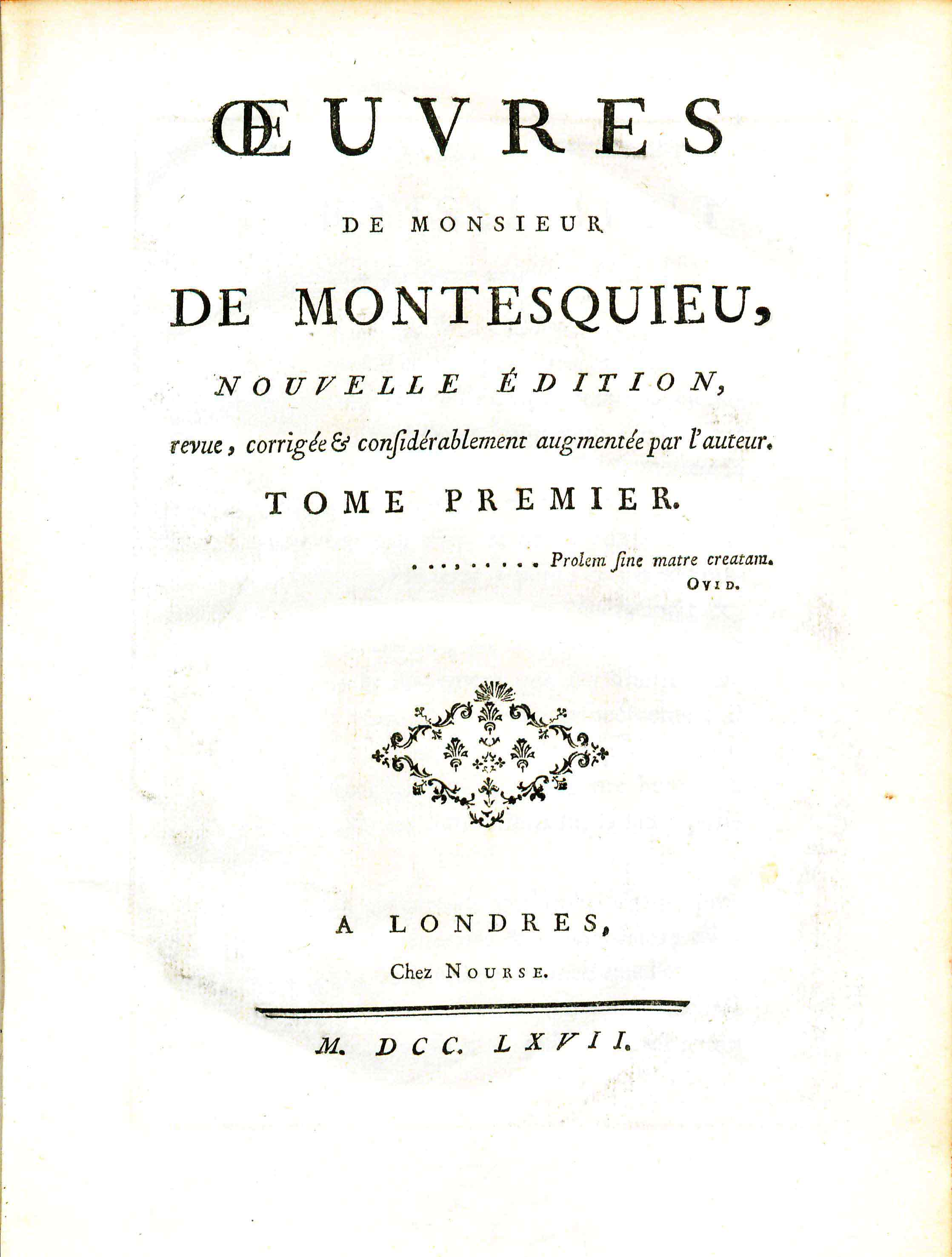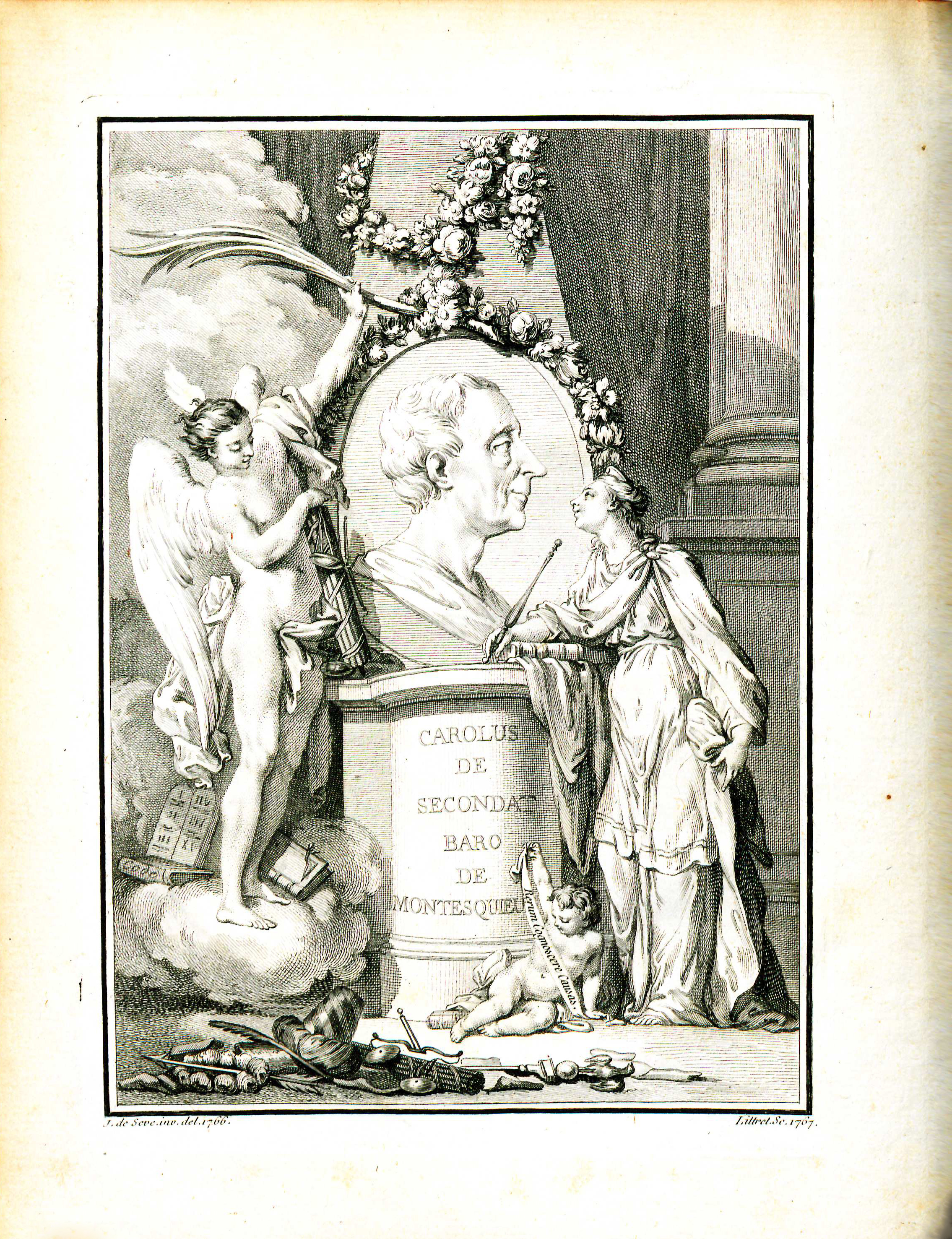Difference between revisions of "Œuvres de Monsieur de Montesquieu"
(Created page with "{{DISPLAYTITLE:''Œuvres de Monsieur de Montesquieu''}} ===by Charles de Secondant, Marquis de Montesquieu=== __NOTOC__ ==Bibliographic Information== '''Author:''' Charles de...") |
m |
||
| (31 intermediate revisions by 10 users not shown) | |||
| Line 1: | Line 1: | ||
{{DISPLAYTITLE:''Œuvres de Monsieur de Montesquieu''}} | {{DISPLAYTITLE:''Œuvres de Monsieur de Montesquieu''}} | ||
| − | ===by Charles de | + | ===by Charles de Secondat, Marquis de Montesquieu=== |
__NOTOC__ | __NOTOC__ | ||
| + | {{BookPageInfoBox | ||
| + | |imagename=MontesquieuOeuvres1767.jpg | ||
| + | |link=https://wm.primo.exlibrisgroup.com/permalink/01COWM_INST/g9pr7p/alma991021754869703196 | ||
| + | |shorttitle=Oeuvres de Monsieur de Montesquieu | ||
| + | |author=[[:Category:Montesquieu|Charles de Secondat, Marquis de Montesquieu]] | ||
| + | |editor=[[:Category:François Richer|François Richer]] | ||
| + | |edition= Nouv. éd. rev., cor., & considérablement augm. par l'auteur. | ||
| + | |lang=[[:Category:French|French]] | ||
| + | |publoc=[[:Category:London|Londres]] | ||
| + | |publisher=Nourse | ||
| + | |year=1767 | ||
| + | |set=3 | ||
| + | |desc=[[:Category:Quartos|4to]] (27 cm.) | ||
| + | |shelf=L-4 | ||
| + | }}[[File:MontesquieuOeuvresdeMonsieurdeMontesquieu1767Frontispiece.jpg|left|thumb|300px|<center>Frontispiece portrait of Montesquieu.</center>]]''Œuvres de Monsieur de Montesquieu'' is the collected work of the Enlightenment-era French jurist, satirist, and political and social philosopher, [https://en.wikipedia.org/wiki/Montesquieu Charles Louis de Secondat, Baron de La Brède and de Montesquieu] (1689-1755). Born at La Brède, Montesquieu received a progressive education at the Oratorian Collège de Juilly and an education in law at University of Bordeaux in 1708.<ref>''World of Sociology'', Gale, s.v. "[http://www.credoreference.com/entry/worldsocs/montesquieu_baron_de_1689_1755 Montesquieu Baron de (1689 - 1755)]," accessed September 26, 2013.</ref> After completing his education, he inherited the barony of Montesquieu in 1716, and the office of Président à Mortier at the Parliament of Guyenne at Bordeaux from his uncle.<ref>''The Cambridge Dictionary of Philosophy'', s.v. "[http://www.credoreference.com/entry/cupdphil/montesquieu Montesquieu]," accessed September 26, 2013.</ref> In 1721, Montesquieu rose to national and international fame when he published his first work, ''Lettres Persanes'' (''The Persian Letters''), a critical commentary of European civilization, customs, and institutions from the point of view of three Persians traveling in Europe. | ||
| − | + | Montesquieu continued to write until his death. His most influential work was, ''L'Esprit des Lois'' (''The Spirit of the Laws''), where he argued that "only a constitutional government that separates its executive, legislative, and judicial powers preserves political liberty, taken as the power to do what one ought to will. A constitutional monarchy with separation of powers is the best form of government."<ref>Ibid.</ref> Montesquieu's idea of separation of powers influenced the authors of the [http://en.wikipedia.org/wiki/United_States_Constitution United States Constitution] and the political philosophers [http://en.wikipedia.org/wiki/Edmund_Burke Edmund Burke] and [http://en.wikipedia.org/wiki/Rousseau Jean-Jacques Rousseau].<ref>''The Cambridge Dictionary of Philosophy'', "Montesquieu."</ref> | |
| − | ''' | ||
| − | ''' | + | ==Evidence for Inclusion in Wythe's Library== |
| + | While studying law under Wythe at the College of William & Mary, [[Thomas Lee Shippen]] wrote to his father describing his course of study, "From breakfast to dinner, I read Blackstone, Hume, or Montesquieu."<ref>Letter from Thomas Lee Shippen to Dr. William Shippen, Jr. N. P. (Williamsburg) February 19, 1784.</ref> The [https://digitalarchive.wm.edu/handle/10288/13433 Brown Bibliography]<ref> Bennie Brown, "The Library of George Wythe of Williamsburg and Richmond," (unpublished manuscript, May, 2012) Microsoft Word file. Earlier edition available at: https://digitalarchive.wm.edu/handle/10288/13433</ref> suggests Wythe owned ''Œuvres de Monsieur de Montesquieu'' based on Shippen's reference and the 1767 edition [[Thomas Jefferson]] sold to the Library of Congress in 1815.<ref>E. Millicent Sowerby, ''Catalogue of the Library of Thomas Jefferson'', (Washington, D.C.: The Library of Congress, 1952-1959), 3:2 [http://babel.hathitrust.org/cgi/pt?id=mdp.39015033648117;view=1up;seq=14 [no.2325]].</ref> [[Dean Bibliography|Dean's Memo]]<ref>[[Dean Bibliography|Memorandum from Barbara C. Dean]], Colonial Williamsburg Found., to Mrs. Stiverson, Colonial Williamsburg Found. (June 16, 1975), 13 (on file at Wolf Law Library, College of William & Mary).</ref> lists "Montesquieu" under the section of titles Wythe assigned to his students citing a reference in William Clarkin's biography of Wythe.<ref>William Clarkin, Serene Patriot: a Life of George Wythe'' (Albany: Alan Publications, 1970), 156.</ref> The Wolf Law Library followed Brown's suggestion and purchased the 1767 edition of ''Œuvres de Monsieur de Montesquieu''. | ||
| + | [[File:MontesquieuOeuvresdeMonsieurdeMontesquieu1767v2Headpiece.jpg|center|thumb|450px|<center>Headpiece, first page of text, volume two.</center>]] | ||
| + | |||
| + | ==Description of the Wolf Law Library's copy== | ||
| + | Bound in full marbled calf. Spines feature five raised bands with gilt decorative compartments and red morocco spine labels. Purchased from Studio Bibliografico Benacense. | ||
| + | Images of the library's copy of this book are [https://www.flickr.com/photos/wolflawlibrary/sets/72157637697678774 available on Flickr.] View the record for this book in [https://wm.primo.exlibrisgroup.com/permalink/01COWM_INST/g9pr7p/alma991021754869703196 William & Mary's online catalog]. | ||
| − | ' | + | ==See also== |
| + | *[[George Wythe Room]] | ||
| + | *[[Wythe's Library]] | ||
| − | + | ==References== | |
| + | <references/> | ||
| − | == | + | ==External Links== |
| + | Read volume one of this book in [http://books.google.com/books?id=fmITAAAAQAAJ&printsec=frontcover#v=onepage&q&f=false Google Books.] | ||
| − | + | [[Category:François Richer]] | |
| + | [[Category:George Wythe Collection at William & Mary's Wolf Law Library]] | ||
| + | [[Category:Montesquieu]] | ||
| + | [[Category:Philosophy]] | ||
| + | [[Category:Titles in Wythe's Library]] | ||
| − | + | [[Category:French]] | |
| − | + | [[Category:London]] | |
| + | [[Category:Quartos]] | ||
Latest revision as of 15:35, 18 January 2023
by Charles de Secondat, Marquis de Montesquieu
| Oeuvres de Monsieur de Montesquieu | |
|
Title page from Oeuvres de Monsieur de Montesquieu, George Wythe Collection, Wolf Law Library, College of William & Mary. | |
| Author | Charles de Secondat, Marquis de Montesquieu |
| Editor | François Richer |
| Published | Londres: Nourse |
| Date | 1767 |
| Edition | Nouv. éd. rev., cor., & considérablement augm. par l'auteur. |
| Language | French |
| Volumes | 3 volume set |
| Desc. | 4to (27 cm.) |
| Location | Shelf L-4 |
Montesquieu continued to write until his death. His most influential work was, L'Esprit des Lois (The Spirit of the Laws), where he argued that "only a constitutional government that separates its executive, legislative, and judicial powers preserves political liberty, taken as the power to do what one ought to will. A constitutional monarchy with separation of powers is the best form of government."[3] Montesquieu's idea of separation of powers influenced the authors of the United States Constitution and the political philosophers Edmund Burke and Jean-Jacques Rousseau.[4]
Evidence for Inclusion in Wythe's Library
While studying law under Wythe at the College of William & Mary, Thomas Lee Shippen wrote to his father describing his course of study, "From breakfast to dinner, I read Blackstone, Hume, or Montesquieu."[5] The Brown Bibliography[6] suggests Wythe owned Œuvres de Monsieur de Montesquieu based on Shippen's reference and the 1767 edition Thomas Jefferson sold to the Library of Congress in 1815.[7] Dean's Memo[8] lists "Montesquieu" under the section of titles Wythe assigned to his students citing a reference in William Clarkin's biography of Wythe.[9] The Wolf Law Library followed Brown's suggestion and purchased the 1767 edition of Œuvres de Monsieur de Montesquieu.
Description of the Wolf Law Library's copy
Bound in full marbled calf. Spines feature five raised bands with gilt decorative compartments and red morocco spine labels. Purchased from Studio Bibliografico Benacense. Images of the library's copy of this book are available on Flickr. View the record for this book in William & Mary's online catalog.
See also
References
- ↑ World of Sociology, Gale, s.v. "Montesquieu Baron de (1689 - 1755)," accessed September 26, 2013.
- ↑ The Cambridge Dictionary of Philosophy, s.v. "Montesquieu," accessed September 26, 2013.
- ↑ Ibid.
- ↑ The Cambridge Dictionary of Philosophy, "Montesquieu."
- ↑ Letter from Thomas Lee Shippen to Dr. William Shippen, Jr. N. P. (Williamsburg) February 19, 1784.
- ↑ Bennie Brown, "The Library of George Wythe of Williamsburg and Richmond," (unpublished manuscript, May, 2012) Microsoft Word file. Earlier edition available at: https://digitalarchive.wm.edu/handle/10288/13433
- ↑ E. Millicent Sowerby, Catalogue of the Library of Thomas Jefferson, (Washington, D.C.: The Library of Congress, 1952-1959), 3:2 [no.2325].
- ↑ Memorandum from Barbara C. Dean, Colonial Williamsburg Found., to Mrs. Stiverson, Colonial Williamsburg Found. (June 16, 1975), 13 (on file at Wolf Law Library, College of William & Mary).
- ↑ William Clarkin, Serene Patriot: a Life of George Wythe (Albany: Alan Publications, 1970), 156.
External Links
Read volume one of this book in Google Books.


